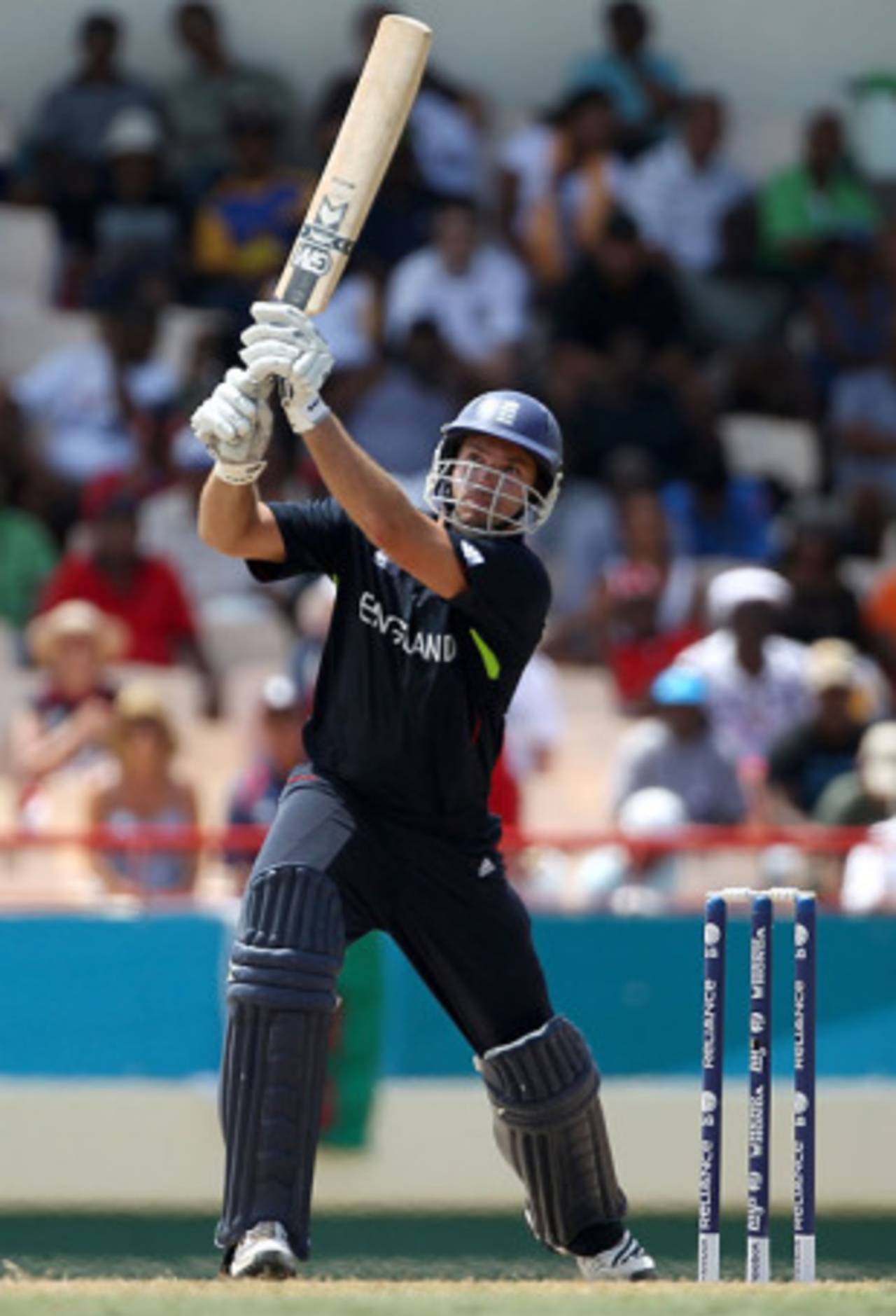Clinical England keep raising the bar
England have never played limited-overs cricket of any form with this verve and conviction
Andrew McGlashan in St Lucia
13-May-2010

The performances of Michael Lumb, and his partner Craig Kieswetter, has given England much-needed impetus at the top • Getty Images
England continue to raise the bar. It was already set pretty high after
three consecutive Super Eight victories, but they produced a clinical
display against Sri Lanka to secure a place in their first global final
since 2004. They bowled with intelligence and skill, fielded with their now
customary athleticism and knocked off the runs with barely an alarm. England
have never played limited-overs cricket of any form with this verve and
conviction.
The standard reaction after each victory has been for Paul Collingwood to
target areas for improvement, but this time it's difficult for even the
harshest critic to pick holes. Tim Bresnan's last over which contained three
wides and cost 15, and Michael Lumb's attempt at a catch which then went
for four were about the only errors.
"Let's be honest, there aren't too many areas we can improve on,"
Collingwood said. "We just need to keep the same mentality - and that's
going to be the hard thing, going into a big game. But the boys keep
responding; every time we talk about it off the pitch, we analyse the
opposition strengths and weaknesses and we keep executing our plans. The
batsmen at the top of the order keep doing it at well, and we're not going
to go too far wrong."
The tone for a Twenty20 innings is often set in the first few overs and on
that count England were always ahead of the game. Sri Lanka fell to 47 for 4
in the ninth over and England replied with an opening stand of 68 in eight.
Ryan Sidebottom's inclusion in this side has sparked plenty of debate with
James Anderson left on the sidelines, but he has justified his selection at
both ends of the innings. On this occasion it was a new-ball wicket as
Sanath Jayasuriya edged limply to second slip to complete a wretched
tournament.
The man who was playing in Twenty20 style before the game was invented has
been a shadow of his former self with a top score of 6 in this tournament.
The end must be nigh. He began the tournament batting as low as he ever has
at No. 8, but, with Tillakaratne Dilshan struggling for form, was promoted
back to opening. Sadly it looks like an occasion where an international
career has been dragged out a little too long. A player like
Jayasuriya shouldn't be remembered for prodding and poking.
Jayasuriya is already an MP in Sri Lanka and his appearance at this tournament
caused some controversy. Kumar Sangakkara refused to be drawn on the
opener's future, but said the team should have been able to cover for
Jayasuriya's lack of form. "Unfortunately he didn't have a great run but to
his credit he stuck with the team through a difficult period and the team
stuck with him. He showed a lot of support and we made sure he felt wanted,
unfortunately he didn't deliver but we still had more than enough quality to
do better than we did today."
England, though, have had too much pain at the hands of Jayasuriya to feel
any sympathy in the middle of a crucial semi-final. Their opening stand of
Lumb and Craig Kieswetter in the run chase was a bit of payback.
Jayasuriya's onslaught in the 1996 World Cup quarter-final left deep scars
and was one reason why England's one-day game stood still for many years.
They tried and failed (with the exception of Marcus Trescothick and maybe
Nick Knight) to find someone who could consistently replicate that type of
hitting.
Even with the creation of Twenty20 players who cleared the ropes on the
domestic scene, England openers were left flapping when promoted to the international
stage. That has lasted until this tournament when the performances of Lumb and
Kieswetter have given England much-needed impetus. The asking rate in this
chase was never tough, but it pays not to get behind against Sri
Lanka's spinners and the openers ensured that didn't happen.
"Sometimes there are finishing pieces to a jigsaw. We had some very good
players among other players but what we needed was a spark at the top of the
order," Collingwood said. "Maybe everyone has seen it as a gamble but we
certainly selected them on potential and we knew what they could do. They
have come and batted fantastically well and really helped the middle order
overcome totals."
Their overall tally of runs won't set pulses racing but it has been the
intent which is vital. The same was true when Jayasuriya formed his
era-defining partnership with Romesh Kaluwitharana. Often it wasn't how
many, but how quickly. Sri Lanka had the mindset that it didn't matter if
they were 70 for 2 after eight overs, the middle order would rebuild.
Translate that to Twenty20 and England are quite happy being 50 for 2 after
five - it's much better than 25 for 1.
It can be dangerous for a batting unit to approach a small target with less
conviction than a tough chase - Lumb and Kieswetter didn't get close to
falling into the trap. They milked Ajantha Mendis, knowing he was the main
threat and didn't have enough runs to play with, and went hard at everyone
else. These are long boundaries in St Lucia; the openers hit three sixes
between them whereas Sri Lanka had one all innings. Kevin Pietersen added two
more for good measure, finishing the match in a flourish to show he had no
jetlag. But they could have won this one without him.
Andrew McGlashan is assistant editor of Cricinfo